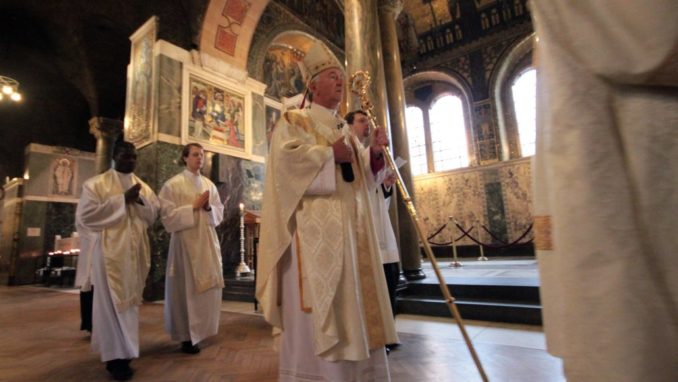
James Bradley, CC BY 2.0, via Wikimedia Commons
On Sundays, the priest preaches a sermon about half-way through Mass. Depending on how good a speaker he is, this is an opportunity to pick up some insights on today’s gospel, or alternatively to drift off and think about Sunday Lunch. Occasionally, the local bishop will send out a letter to be read out instead of a sermon, usually at the beginning of Lent and Advent. And rarely, His Eminence Cardinal Vincent Nichols and all the bishops will get together and send out a joint letter. This usually happens at election time, when they remind us about the importance of voting, though they stop short of endorsing any parties. It used to be that Catholics voted Labour and the Anglican Church was known as ‘the Tory party at prayer’, but those distinctions are fading.
And last Sunday, the bishops sent out a joint letter on Assisted Dying. I don’t think Vinnie will complain if I quote him extensively…
* * *
I wish to speak to you today about the process in which our Parliament is currently considering legalising assisted suicide through the Terminally Ill Adults (End of Life) Bill. As I have made clear earlier in this debate, as Catholics we have maintained a principled objection to this change in law recognising that every human life is sacred, coming as a gift from God and bearing a God-given dignity. We are, therefore, opposed to this Bill in Principle, elevating, as it does, the autonomy of the individual above all other considerations.
The passage of the Bill through Parliament will lead to a vote in late April on whether it progresses further. This will be a crucial moment and I, together with all the bishops pf England and Wales, am writing to ask for your support in urging your MP to vote against this Bill at that time.
There are serious reasons for doing so. At this point we wish not simply to restate our objections in principle, but to emphasise the deeply flawed process undergone in Parliament thus far. We wish to remind you that it is a fundamental duty of every MP to ensure that legislation is not imposed on our society which has not been properly scrutinised and which will bring about damaging consequences.
The Terminally Ill Adults (End of Life) Bill will fundamentally change many of the key relationships in our way of life: within the family, between doctor and patient, within the health service. Yet there has been no Royal Commission or independent inquiry ahead of its presentation. It is a Private Member’s Bill. The bill itself is long and complex and was published just days before MPs voted on it, giving them inadequate time to consult or reflect upon it. The time for debate was minimal. The Committee examining the Bill took only three days of evidence: not all voices were heard, and it comprises an undue number of supporters of the Bill. In short, this is no way to legislate on such an important and morally complex issue.
One consequence of this flawed process is that many vital questions remain unanswered. Can MPs guarantee that the scope of the bill will not be extended? In almost every country where assisted suicide has been introduced the current scope is wider than was originally intended. What role, if any, will the judiciary have in the process? We were told that judicial oversight was a necessary and vital part of the process; now we are told that it isn’t needed at all. What will protect the vulnerable from coercion, or from feeling a burden on family? Can the National Health Service cope with assisted suicide or will it, as the Health Secretary has warned, cause cuts elsewhere in the NHS? Can MPs guarantee that no medical practitioner would be compelled to take part in assisted suicide? Would this mean the establishment of a ‘national death service’?
In contrast to the provisions of this Bill, what is needed is first-class, compassionate palliative care at the end of our lives. This is already provided to many in our society but, tragically, is in short supply and underfunded. No-one should be dispatched as a burden to others. Instead, a good society would prioritise care for the elderly, the vulnerable, and the weak. The lives of our families are richer for cherishing their presence.
It is sad reflection on Parliament’s priorities that the House of Commons spent far more time debating the ban on fox hunting than it is spending bringing in assisted suicide.
I am sure you will share these concerns. It is now clear that this measure is being rushed without proper scrutiny and without fundamental questions surrounding safeguards being answered. This is a deeply flawed Bill with untold unintended consequences.
Every MP, and Government, has a solemn duty to prevent such legislation reaching the statute book. This, tragically, is what may happen. So I appeal to you: even if you have written before, please make contact with your MP and ask them to vote against this Bill not only on grounds of principle but because of the failure of Parliament to approach this issue in an adequate and responsible manner.
May God bless you all.
Vincent Cardinal Nichols Archbishop of Westminster
* * *
Sobering reading. I am old enough to remember the Abortion Act, introduced as a Private Members Bill in 1966 by David Steele. I don’t think the opposition got its act together, Home Secretary Roy Jenkins gave the Bill extra Parliamentary time, and the result was the 1967 Act.
I expect Kier Starmer to take a similar line with the current Bill, given his promise before the election to Esther Rantzen to get her a vote in Parliament on the issue.
The trouble with representative democracy, is that, once elected, we have to hope our politicians will represent us. Over the next month, this issue will be decided by 650 people, and the coming vote is something of a one-way valve. If AD gets voted in, no matter how flawed the Bill is, there will be no going back. The genie will be out of the bottle.
© Jim Walshe 2025



